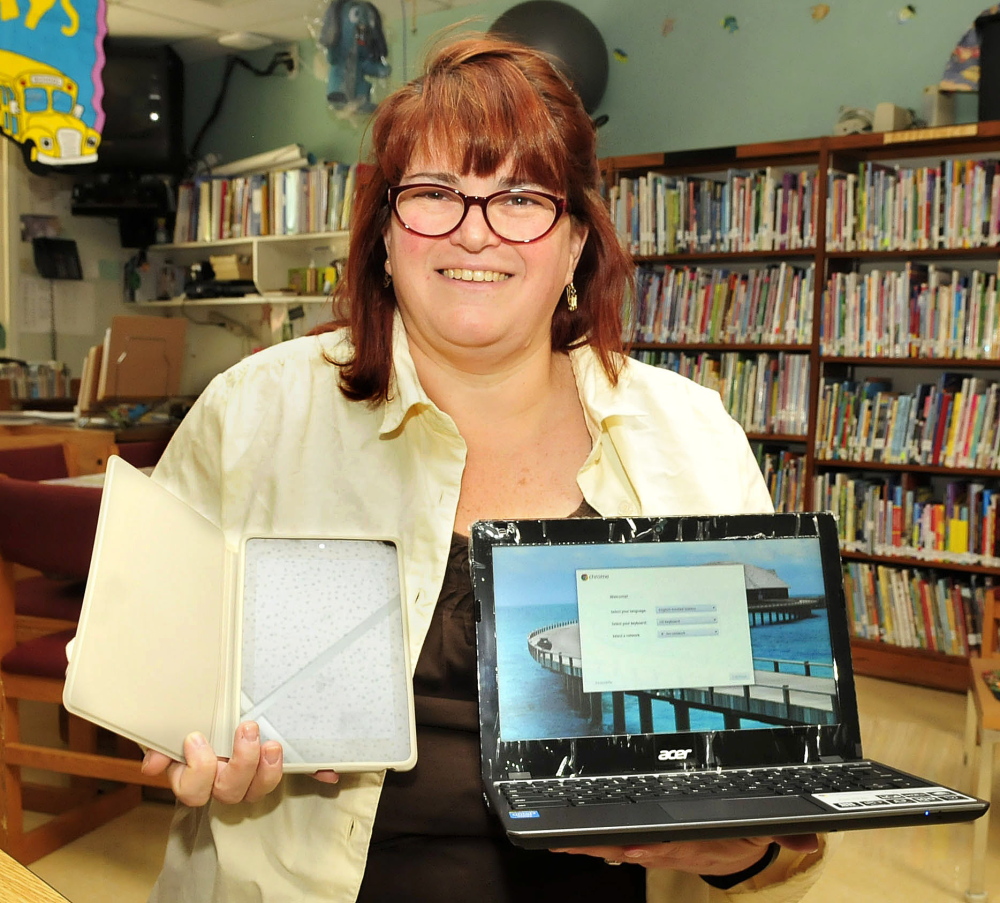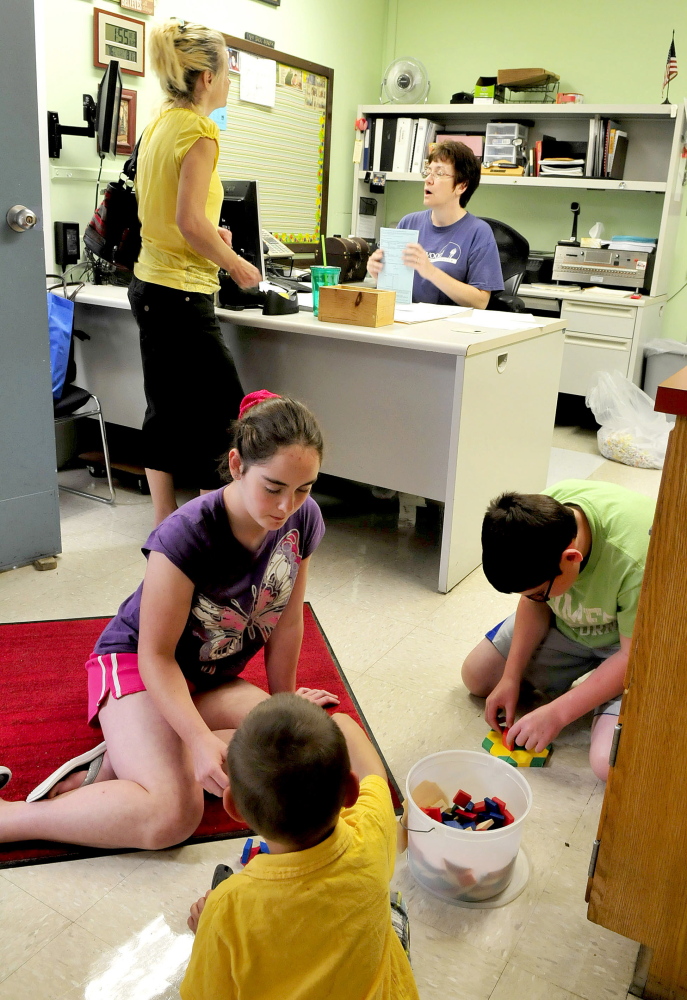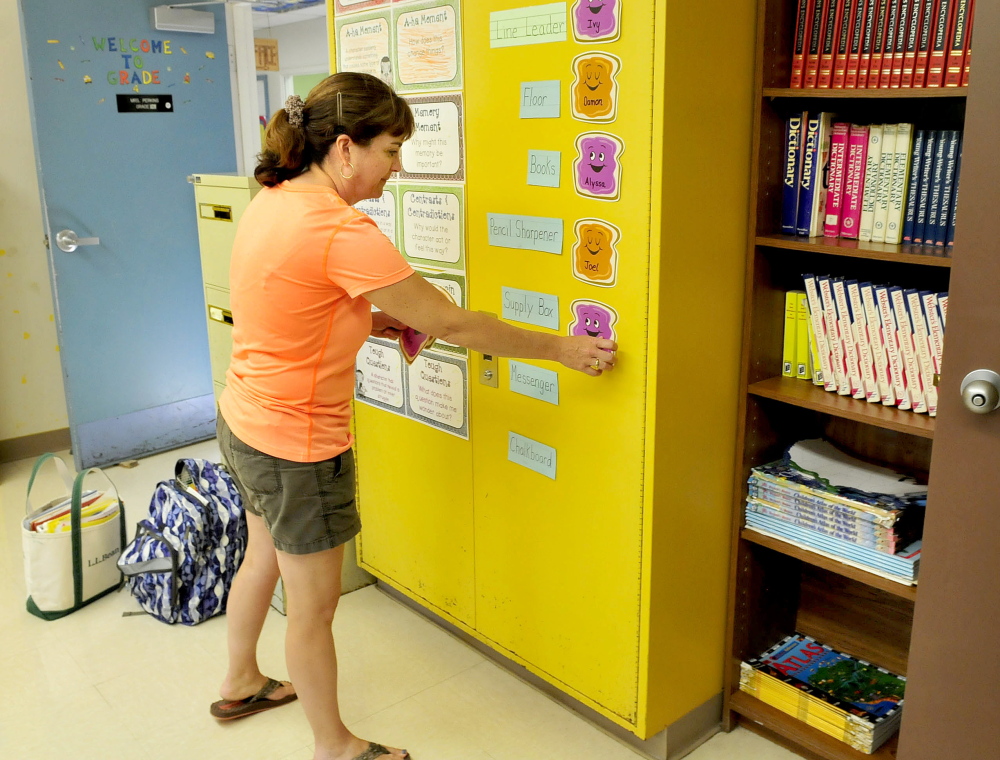ATHENS — As the first day of a new school year approaches, there is a lot more confidence in this small community than there was one year ago.
The school garden overflows with sunflowers, tall stalks of corn and squash vines. Sports practices have started and teachers are preparing for a new technology initiative — providing a wireless device, whether in the form of a laptop or tablet, for every student.
“Last year was different because no one knew what to expect,” said Principal Cynthia Streznewski. “Now people are more comfortable. There was a lot of fear before, but that’s shifting because we’ve been successful.”
The start of the new school year marks an important milestone for the pre-K through grade 8 school. It is one year since the community took over the operation of the school after withdrawing from the local school district, Madison-based School Administrative District 59.
Athens is one of 15 municipalities around the state that have withdrawn from their local districts in the years following a 2007 law to encourage consolidation. Meanwhile, there are currently another 17 communities that are in the process of withdrawing, according to the start Department of Education, and even more that are exploring the process.
Withdrawal is not easy — the 21-step process has been challenging, but school officials, teachers and community members in Athens say that one year later, the school is thriving.
On Tuesday the final step in the yearlong withdrawal process took place in the library of the school, with board members voting to officially be incorporated into AOS94, an alternative district made up of independently run schools that share some services such as a superintendent and other administrators.
There are many reasons schools may decide to leave a district, including lack of communication within the district, cost sharing that seems unfair and lack of local control, said Paula Gravelle, school finance coordinator for the Department of Education.
For years Athens, a community of about 850 people, belonged to School Administrative District 59, which until 2011 included four communities: Athens, Brighton Plantation, Madison and Starks.
But when Starks withdrew in 2011 and the structure of the school board changed, some residents in Athens felt they were not given enough say in comparison to the much larger town of Madison. There was talk of closing the Athens school as the district faced a declining enrollment and higher costs, partly due to the rise of charter schools in the area, decreases in state subsidies and a shift in teacher retirement costs from the state to local level.
“Athens of course didn’t want their small school closed, and that was one of the main reasons they withdrew,” said Gravelle, who also processes the withdrawals for the department.
The state believes there are cost savings, especially on the administrative level, when schools are part of a group like a district, which is one of the reasons why the 2007 law was passed, said Gravelle, and why the state education department has traditionally supported consolidation.
“Along the same lines, that money can be spent to further educational opportunities,” she said. “And when there are more towns, communities or schools together, they can create more opportunities by combining resources.”
ANOTHER VIEW
People in Athens see things differently.
“I can’t even begin to calculate the benefits to the community following the withdrawal,” said Dan Viles, a parent and school board member.
One of the things the school is most excited about in the coming year is the new technology they will be getting, including new Google Chromebooks for every 3rd and 4th grade student and new Nexus tablets for all kindergarten through second grade students.
The improved technology, which the school is financing with a loan of up to $17,225 this year, is a priority that Viles said would not have been possible in SAD 59.
“Being able to say that we can put a device in the hands of every kid is really fantastic,” he said. “There’s not a lot of schools that can say that, and it’s possible because we have the ability now to prioritize what things we really want to see happen.”
There have also been building upgrades— a new security system, a refinished gym floor and updates to heating and ventilation systems.
Outside the school garden is teeming with flowers and vegetables. It’s the best garden the school has had in years, said Beverly Foss, a first-grade teacher who has taught at the school for 40 years.
The last year was challenging, but having dedicated school board members and administrators have made the transition easier, Foss said. There are no hard feelings towards the old district, and she said she never had complaints being part of it, but things are different now that the school is on its own, she said. For example, one of the things that helped the garden this year was a donation of fresh manure from a local farmer.
“I think people are more inclined to do things like that now because they can see where their donation is going,” she said. “Everything goes to their own kids, to Athens kids.”
STRONGER COMMUNITY
At the Athens Corner Store, one of two stores in town, the consensus among people going in and out on a recent afternoon is that withdrawal has generally been a good thing, or that they haven’t noticed a lot of changes.
“Now that the school is its own thing, I think the community is getting stronger,” said Katelin Langlois, an employee at the store and the mother of a first-grade student. “More people are helping out with different things.”
Transportation is harder, especially for high school students, who now have a choice of area high schools to attend, but must either spend long hours trying to catch buses when and where they can or find other ways to get themselves to school.
Angela Allmendinger, whose son is in fifth grade and daughter in fourth grade, said she sends her children to Madison Elementary School because the small Athens school doesn’t have the special education resources her son needs.
Because Athens is no longer part of the district, that means Allmendinger has to either drive the children to school or drop them off to catch the bus in Madison.
Louis Johnson is the third selectman in Brighton Plantation, a nearby community that withdrew at the same time as Athens, and said that although it is a little more expensive — for the 2013-2014 school year Athens residents were asked to raise about $45,000 more in local funding than the Madison district was asking from them — there are not a lot of drawbacks.
All students in Brighton Plantation, which has a population of about 37 people and typically enrolls about seven students, have a choice of elementary and high school.
“We have more local control now, which was really important,” said Johnson. “There are a lot of kids that still go to Madison schools, but with high school choice a lot of them also go to Pittsfield, which is a great school.”
For students, the withdrawal hasn’t been noticeable, said 13-year-old Darlene Bates, a student at the Athens school.
“I’m excited to see my friends and have art class with my awesome art teacher,” said Bates, when asked what things she was most looking forward to in the new school year.
Still, there are some challenges with running the school outside the district. The school doesn’t operate completely independently — it is part of AOS 94, the alternative school district that allows municipalities the chance to maintain control over their own schools while sharing administrative services.
The structure provided them with support through the first year of budgeting and allows the school to collaborate with other nearby small schools, such as the Harmony Elementary School, for things like teacher and staff training and sports teams.
The school wants to hire a new gym teacher, but is having trouble filling the position, a part-time job that would require one day per week at the Athens school and one day at the Harmony school.
“It can be difficult to attract teachers, especially if the position you are offering is only for two or three days per week,” said Viles. “By working with Harmony we’re hoping we can retain better people.”
For extra-curricular and arts activities, having enough students to participate and the teachers to organize them can also be hard. There is talk of sending students to Harmony to participate in band.
The schools also share a principal. “It seems like I’m inevitably in the wrong place at the wrong time,” said Streznewski, but a system of “lead teachers” has been developed in each building— a teacher who acts as principal when she isn’t there.
“It’s still the beginning,” she said. “We might have to pick and choose around what things are important to us, but we’re building that relationship.”
Rachel Ohm — 612-2368
Send questions/comments to the editors.






Comments are no longer available on this story